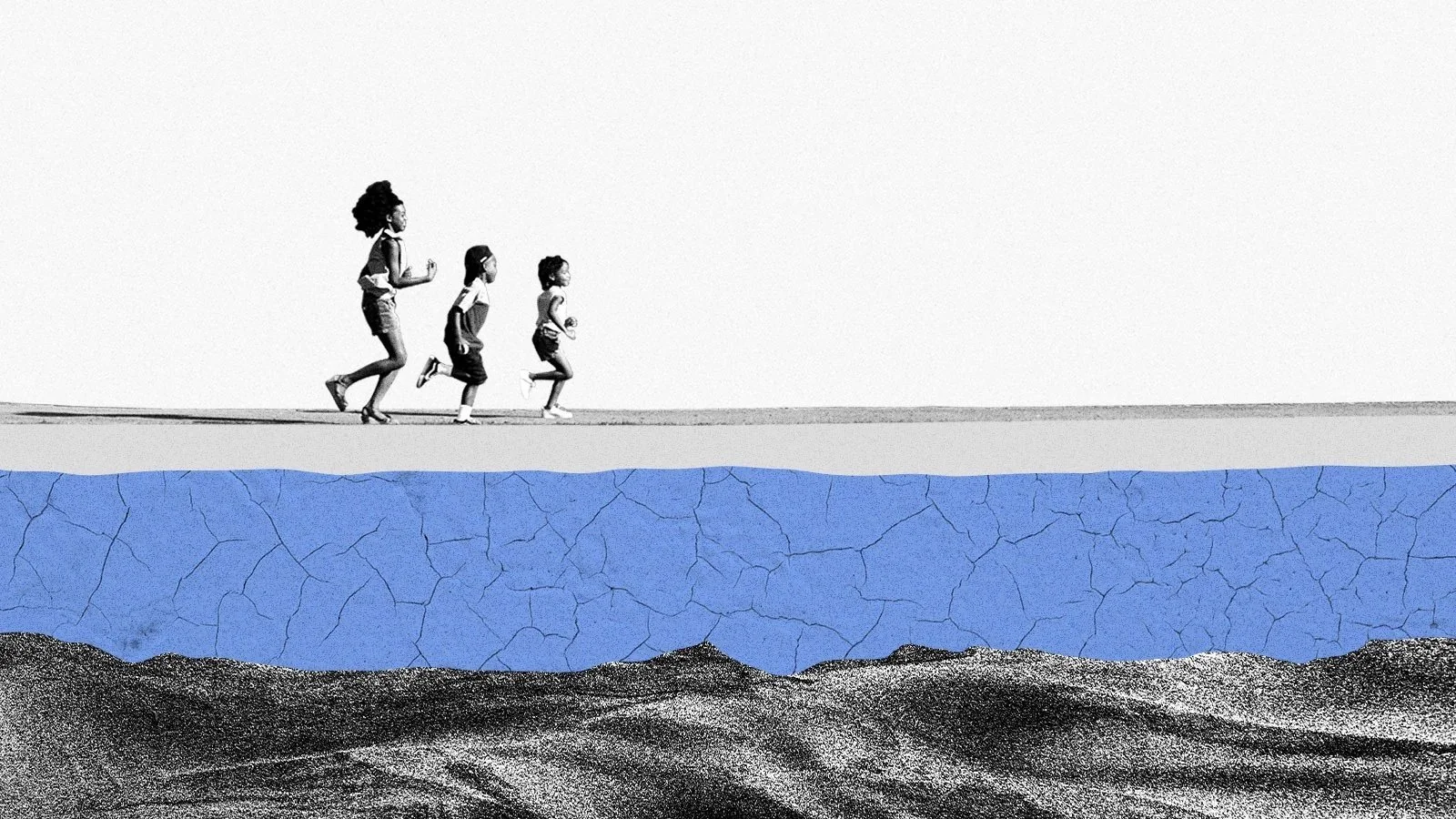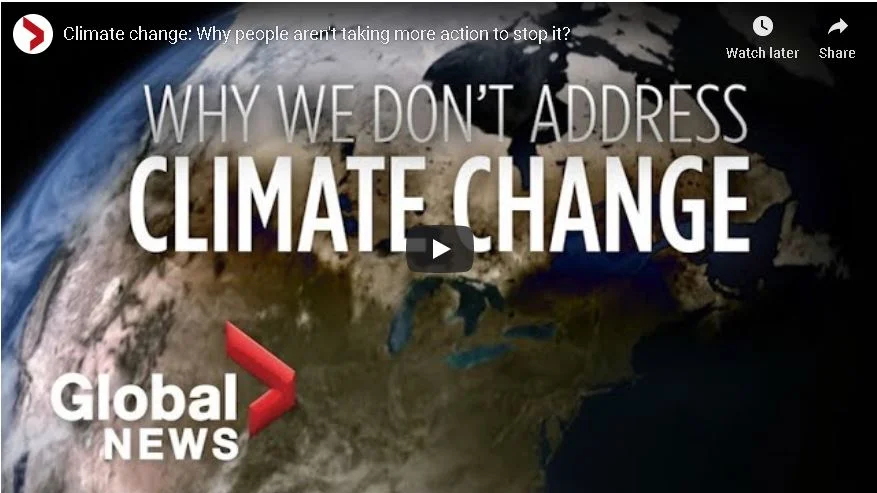The ocean shelf off Labrador has hit record high temperatures this summer, according to the federal Department of Fisheries and Oceans. St. John's-based DFO research scientist Frederic Cyr told CBC News the summer of 2023 has been "pretty incredible" for the world ocean. "The entire North Atlantic reached record high temperatures," said Cyr — although it's still generally colder than the rest of the ocean, he added.
23 Saint Johners trapped laundry lint for a year to keep microplastics out of waterways
Taylor Kormann didn't know what to expect when she signed up to collect the goopy leftovers of her laundry cycles for a year as a part of a citizen science project for the Atlantic Coastal Action Program. "It was almost shocking to see what's coming out of the laundry," Kormann said. Kormann and 22 other Saint John residents spent 2022 collecting the wet lint from their washing machines to measure the microplastics their wash cycles were contributing to the city's water system.
It’s not just oceans rising. It’s groundwater, too
Beneath our feet there is an invisible ocean. Within the cracks of rock slabs, sand and soil, this water sinks, swells and flows — sometimes just a few feet under the surface, sometimes 30,000 feet below. This system of groundwater provides a vital supply for drinking and irrigation, and feeds into rivers, lakes, and wetlands. Across the globe, it contains 100 times as much fresh water than all the world’s rivers and lakes combined.
Rare, flesh-eating bacteria on the rise in U.S. waters. Will it reach Canada?
A rare and fatal flesh-eating bacteria is slowly creeping up the eastern U.S. coast, and some experts warn that it could eventually find its way into Canada if climate change continues to heat our oceans and lakes. The bacteria Vibrio vulnificus is usually found in subtropical regions, like the Gulf Coast (in states like Florida and Texas), which is home to warm waters with low salt content. But a recent study published on March 23 in the Scientific Reports journal said that over the last few decades, there has been an increase in the bacteria in northern locations near New Jersey and Delaware.
MP wants to ban polystyrene to keep foams out of Canada’s oceans, Island shores
North Island-Powell River MP Rachel Blaney wants to take polystyrene out of Canada’s oceans. Blaney introduced a private member’s motion to the House of Commons urging the government to ban both expanded polystyrene (EPS) and extruded polystyrene (XPS) from floating structures like docks. “Research suggests that dock flotation foam is one of the leading causes of plastic pollution in Canada’s oceans, lakes, and rivers,” Blaney says. “When microparticles become part of the aquatic environment, they are consumed by fish, dolphins, whales, and birds. They can also work their way into the food system. This is a critical threat to the ocean, the ecosystem, and to human health.”
Why do oceans matter for climate change?
As the climate crisis gets worse, oceans — the planet’s greatest carbon sink — can no longer be overlooked. Spanning 70 per cent of the globe, oceans have absorbed nearly a third of the planet-warming greenhouse gas emissions caused by humans and 90 per cent of the excess heat those gases create. The heat stored in the Earth’s entire atmosphere is equal to what’s stored in the top few metres of our oceans. If that wasn’t enough, oceans produce more than 50 per cent of the planet’s oxygen and regulate our climate and weather patterns.
Why do oceans matter for climate change?
As the climate crisis gets worse, oceans — the planet’s greatest carbon sink — can no longer be overlooked. Spanning 70 per cent of the globe, oceans have absorbed nearly a third of the planet-warming greenhouse gas emissions caused by humans and 90 per cent of the excess heat those gases create. The heat stored in the Earth’s entire atmosphere is equal to what’s stored in the top few metres of our oceans. If that wasn’t enough, oceans produce more than 50 per cent of the planet’s oxygen and regulate our climate and weather patterns.
NASA-led international satellite mission to conduct first global water survey from space
A NASA-led international satellite mission is set to conduct a comprehensive survey of the world's oceans, lakes and rivers for the first time. The advanced radar satellite, dubbed SWOT (Surface Water and Ocean Topography), is designed to give scientists an unprecedented view of the fluid that covers 70 per cent of the planet. The survey will be able to shed new light on the mechanics and consequences of climate change.
What is nuclear fusion and why is it such a big deal?
Here on Earth, nuclear fusion is produced by fusing the elements deuterium and tritium. Deuterium is quite plentiful and can be found in water, but is most abundant in our oceans. Tritium, on the other hand, is less plentiful and is primarily found in our atmosphere, a result of cosmic radiation. Tritium is also made in nuclear explosions and is a byproduct from nuclear reactors.
GOLDSTEIN: The last straw -- Canada's single use plastics ban means more garbage
While the impact analysis says here will be a net environmental benefit from eliminating single use plastics, including the reduction of 1.8 million megatonnes of greenhouse gases annually, it also says some substitutes will have a higher climate change impact, as well as negative effects on air and water quality. The government says, based on 2019 data, that 15.5 billion plastic grocery bags a year were being sold in Canada, 5.8 billion straws, 4.5 billion pieces of cutlery, three billion stir sticks, 805 million takeout containers and 183 million six-pack rings. The six categories of single use plastics subject to the ban account for an estimated 160,000 tonnes of plastic waste annually, just 5% of the overall amount of 3.3 million tonnes of plastic waste. Of that, 86% ends up in landfills, 4% is burned, a dismal 9% is recycled — so much for all those years of faithful blue box recycling — and about 1%, or 29,000 tonnes, is discharged into the environment as litter, with 2,500 tonnes ending up in oceans, lakes and rivers.
Low creek levels on Vancouver Island threaten spawning salmon
It’s the time of year when salmon are returning to freshwater to spawn, but across the Island, fish are holding out in the ocean, waiting for the seasonal rise in creek levels to take hold and allow them to complete their life cycle. On average, Victoria sees about 88 millimetres of rain in October; so far there has been none with no precipitation in the forecast for the next week. In fact, it’s been weeks since the Island had any sizable amount of rain at all. Greater Victoria alone has only had 2mm since July 8, and water levels are falling across the region.
Your letters for June 10, 2022
Earlier this week, I thought about the amount of water it takes to wash one’s glasses. The same amount of water is required for an entire day by a family of four in some parts of Africa. In Canada, we are lucky to have the greatest supply of water per square foot than anywhere else in the world. It is also the cleanest. It amazes and amuses me that we still buy bottled water from suppliers who use our water to sell back to us. Do we waste any of our precious water? Yes, we do, in countless ways. Do we give away our water to the U.S.? Yes, we do, and often we fail to collect, due to Chapter 11 bankruptcies that frequently occur south of the border.
Our oceans are hotter than ever. Scientists say they worry about what that means for our future
Amid another record warm year for the planet, one of the most dramatic and alarming changes occurred in our oceans, according to the National Oceanic and Atmospheric Administration (NOAA). They are the warmest they've been in recorded history. In fact, the ocean heat has been topping its own record annually for the past seven years, with last year's record set despite the absence of El Niño — a warming in part of the Pacific Ocean that tends to drive up global temperatures.
Lachine environmental group wants to reduce microplastics entering our waters
Textiles are the largest known source of microplastic pollution in the world's oceans — making up around 35 percent of microfibres released into the waters. Every time you wash your clothes, tiny fibres are released into the waste water. These fibres then travel into lakes, oceans and marine organisms. And while most of it becomes fragmented from wastewater treatments, a large volume still escapes and the long term effects of that are still largely unknown.
Wade in the water
Look closely at our history, culture, and lore, and you’ll find water at its heart. We are nestled between three oceans, and enjoy our lakes, rivers, and ponds year-round. And while we are raised in, on, and around it, recent years have hammered home the billions of reasons why we can’t ever take water for granted. A full 20 percent of the world’s freshwater lives here. Only about seven percent of it is renewable―coming into our rivers and lakes from rain and snowmelt―and climate change warnings have made clear that it is at risk. A recent UN report on climate change paints a grim picture globally of higher temperatures, extreme drought, and rising sea levels. And Canada isn’t immune—on June 29th this year, British Columbia recorded its hottest temperature in history. In fact, as Canada is warming on average at twice the rate as the rest of the world, its global role in water conservation is more important than ever.
Fresh water–our greatest asset
From the beginning of time on earth fresh water supply has been humanity’s main concern. Fresh water is the key to humankind’s prosperity or poverty, comfort or misery. Without fresh water there would be no life on earth. While water covers three-quarters of the earth’s surface, it cannot always be found where it is most needed, when it is needed and in the amounts that are required.
New Water Clues On Uranus And Neptune
The ice giant planets Uranus and Neptune are water-rich worlds with deep layers of ice or possibly liquid water beneath their thick atmospheres. Their interior “oceans” are more extensive than the oceans on Earth or the ice deposits and/or subsurface lakes on Mars. There’s a lot we don’t know about the water layers on Uranus and Neptune. In May 2021, researchers in the U.S. and South Korea announced new findings suggesting the water layers of these exotic water worlds might be rich in magnesium. This finding provides clues to their interior chemistry.
'I was wondering why the water looked so clean': CRD's sewage treatment plant up and running
Victoria and surrounding municipalities are no longer dumping untreated sewage into the ocean — much to the delight of our neighbours south of the border. Washington state Governor Jay Inslee, who has a house on Bainbridge Island, is among those welcoming news that, after four years of construction, the Capital Regional District’s $775-million Wastewater Treatment Project has begun treating sewage at the McLoughlin Point plant.
Water shortages and yearly floods: Canada won’t escape climate crisis, UN report says
Damage to Earth’s oceans and glaciers from climate change is outpacing the ability of governments to protect them, a new report from an international scientific panel concludes. “The capacity of governance systems in polar and ocean regions to respond to climate change impacts has strengthened recently,” says the Intergovernmental Panel on Climate Change. “But this development is not sufficiently rapid or robust to adequately address the scale of increasing projected risks.”




















